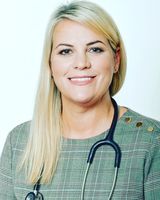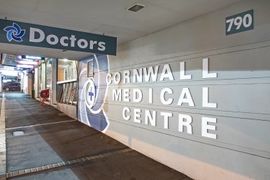Central Auckland > GPs / Accident & Urgent Medical Care > ProCare >
Cornwall Medical Centre
General Practice (GP) Service
Today
8:00 AM to 5:00 PM.
Description
Welcome to Cornwall Medical Centre.
We are a well-established, multi-award winning medical centre where the style of the traditional family doctor practice is valued. We have looked after many generations of families over the years and value this special relationship.
Our philosophy has always been to deliver quality long term health care, primarily administered by the six long term GP partners and their team of dedicated and knowledgeable nurses. Our nurses have a range of skills including wound care, dressing, performing childhood and travel immunisations and cervical smear taking. We also perform skin checks and mole removals.
We are located right by the Royal Oak roundabout, with ample free parking at the back. There is a pharmacy and a dental practice in the same building, as well as a physio and a podiatrist next door.
Consultations are by appointment only.
Doctors
-

Dr Vincent Chan
General Practitioner - Vocationally Registered
-

Dr Bethany Eames
General Practitioner - Vocationally Registered
-

Dr Wee-Ling Khoo
General Practitioner - Vocationally Registered
-

Dr An Lim
General Practitioner - Vocationally Registered
-

Dr Ker Liong
General Practiioner - Vocationally Registered
-

Dr Jacqueline Tam
General Practitioner - Vocationally Registered
-

Dr Steven Tan
General Practitioner - Vocationally Registered
-

Dr Peter Zink
General Practitioner - Vocationally Registered
How do I access this service?
Enrolled patients, Make an appointment
Enrolling new patients
Fees
Enrolled Patient Fees
| Age Range | Without CSC | With CSC |
|---|---|---|
| Under 6 years | Free | Free |
| 6 to 13 years | Free | Free |
| 14 to 17 years | $44.00 | $13.00 |
| 18 to 24 years | $65.00 | $20.00 |
| 25 to 44 years | $76.00 | $20.00 |
| 45 to 64 years | $76.00 | $20.00 |
| 65+ years | $75.00 | $20.00 |
From 3rd November 2025
|
ENROLLED PATIENTS |
|||
|
|
Community Services Card holders - standard & ACC |
Standard & ACC (non-Community Services Card) |
|
|
Under 14 Years |
$0 |
$0 |
|
|
14–17 Years |
$13 |
$44 |
|
|
18-24 Years |
$20 |
$65 |
|
|
Adult 25-64 Years |
$20 |
$76 |
|
|
Adult 65 & over |
$20 |
$75 |
|
|
NON-ENROLLED & CASUAL PATIENTS * |
|||
|
|
Standard |
Standard with Community Card |
ACC |
|
Under 6 Years |
$48 |
$48 |
$48 |
|
6-13 Years |
$88 |
$78 |
$58 |
|
14-17 Years |
$98 |
$88 |
$98 |
|
18-24 Years |
$118 |
$108 |
$108 |
|
Adult 25-64 Years |
$138 |
$118 |
$118 |
|
Adult 65 & over |
$138 |
$118 |
$118 |
*Non NZ Residents charges $178 for all ages
Please note:
Fees may vary due to time or materials used
Payment is expected at the time of consultation.
Hours
8:00 AM to 5:00 PM.
| Mon – Fri | 8:00 AM – 5:00 PM |
|---|
We are open Mon-Fri 8am-5pm If you need a Covid test, please call to book.
Recommended after-hours virtual provider: If it's after hours or if one of our doctors is not available, you can get a virtual GP consultation with a real doctor by using CareHQ, from 7am-10pm, 7 days per week. Find out more.
Public Holidays: Closed Waitangi Day (6 Feb), Good Friday (3 Apr), Easter Sunday (5 Apr), Easter Monday (6 Apr), ANZAC Day (observed) (27 Apr), King's Birthday (1 Jun), Matariki (10 Jul), Labour Day (26 Oct), Auckland Anniversary (1 Feb).
Preferred urgent care clinic out of hours: White Cross Ascot - Urgent Care.
Languages Spoken
English, Cantonese Chinese, Mandarin Chinese
Services Provided
Immunisation is the safest and most effective way to provide protection for you and your tamariki’s health. For more information view the NZ immunisation schedule.
Immunisation is the safest and most effective way to provide protection for you and your tamariki’s health. For more information view the NZ immunisation schedule.
- Pregnancy vaccinations
- Childhood immunisation programme
- 45 year old vaccinations
- 65 year old vaccinations
- Adult flu vaccine
- Child flu vaccine
- Diphtheria / Tetanus / Pertussis (whooping cough) vaccine
- Human Papillomavirus (HPV) vaccine
- Measles / Mumps / Rubella (MMR) vaccine
- Meningococcal vaccine
- Shingles vaccine
- Travel vaccinations
- Catch-up missed vaccinations
- Privately funded vaccinations
- COVID-19 vaccination and boosters
- Respiratory syncytial virus (RSV) vaccine
Immunisation is the safest and most effective way to provide protection for you and your tamariki’s health. For more information view the NZ immunisation schedule.
A patient portal is a secure online tool provided by GP practices that can allow convenient access to your health information as well as interaction with the practice e.g. booking appointments and requesting repeat prescriptions. We now offer access to online bookings, repeat prescriptions & viewing your laboratory results (securely & confidentially to you) through Manage My Health for ENROLLED patients. Enquire at reception. You will need to have both a cellphone number and an email address.
A patient portal is a secure online tool provided by GP practices that can allow convenient access to your health information as well as interaction with the practice e.g. booking appointments and requesting repeat prescriptions. We now offer access to online bookings, repeat prescriptions & viewing your laboratory results (securely & confidentially to you) through Manage My Health for ENROLLED patients. Enquire at reception. You will need to have both a cellphone number and an email address.
A patient portal is a secure online tool provided by GP practices that can allow convenient access to your health information as well as interaction with the practice e.g. booking appointments and requesting repeat prescriptions.
We now offer access to online bookings, repeat prescriptions & viewing your laboratory results (securely & confidentially to you) through Manage My Health for ENROLLED patients. Enquire at reception. You will need to have both a cellphone number and an email address.
Your GP's surgery is far more than a place to go when you are feeling unwell and needing a quick cure. The doctor who sees you has gone through an extensive medical training to equip her or him to help children and adults of all ages with a range of physical and emotional difficulties. GPs are at the centre of the healthcare hub and will be aware of services and expertise that are available locally and further-a-field. GPs are also aware of the link that stress and unhappy life events have on physical health so know when to suggest a talking therapy rather than medication.
Your GP's surgery is far more than a place to go when you are feeling unwell and needing a quick cure. The doctor who sees you has gone through an extensive medical training to equip her or him to help children and adults of all ages with a range of physical and emotional difficulties. GPs are at the centre of the healthcare hub and will be aware of services and expertise that are available locally and further-a-field. GPs are also aware of the link that stress and unhappy life events have on physical health so know when to suggest a talking therapy rather than medication.
Your GP's surgery is far more than a place to go when you are feeling unwell and needing a quick cure. The doctor who sees you has gone through an extensive medical training to equip her or him to help children and adults of all ages with a range of physical and emotional difficulties. GPs are at the centre of the healthcare hub and will be aware of services and expertise that are available locally and further-a-field. GPs are also aware of the link that stress and unhappy life events have on physical health so know when to suggest a talking therapy rather than medication.
Primary care practices offer a range of services and are able to deal with most minor accident care. If they are not able to deal with an injury they will refer on to the appropriate service. ACC dressings are free for first 4 consultations in most cases
Primary care practices offer a range of services and are able to deal with most minor accident care. If they are not able to deal with an injury they will refer on to the appropriate service. ACC dressings are free for first 4 consultations in most cases
Primary care practices offer a range of services and are able to deal with most minor accident care. If they are not able to deal with an injury they will refer on to the appropriate service.
ACC dressings are free for first 4 consultations in most cases
Minor surgery is commonly provided in primary care practices, providing fast, competent removal and biopsies of skin lesions. Other services include cosmetic work such as removal of benign moles and skin tags. Ingrown toenail surgery is also commonly provided. These conditions do not need to be referred to a hospital, perhaps saving you a long wait or a cancelled appointment when a more serious case takes priority. Diagnosis of skin lesions aided by Dermatoscopy (magnified transilluminated) - is performed by several of our GPs who have undergone special training
Minor surgery is commonly provided in primary care practices, providing fast, competent removal and biopsies of skin lesions. Other services include cosmetic work such as removal of benign moles and skin tags. Ingrown toenail surgery is also commonly provided. These conditions do not need to be referred to a hospital, perhaps saving you a long wait or a cancelled appointment when a more serious case takes priority. Diagnosis of skin lesions aided by Dermatoscopy (magnified transilluminated) - is performed by several of our GPs who have undergone special training
Minor surgery is commonly provided in primary care practices, providing fast, competent removal and biopsies of skin lesions. Other services include cosmetic work such as removal of benign moles and skin tags. Ingrown toenail surgery is also commonly provided.
These conditions do not need to be referred to a hospital, perhaps saving you a long wait or a cancelled appointment when a more serious case takes priority.
Diagnosis of skin lesions aided by Dermatoscopy (magnified transilluminated) - is performed by several of our GPs who have undergone special training
Each GP surgery or primary care practice will have its own procedure for repeat prescribing but the following rules are common to most, if not all. Patients who are well-known to the practice who have a stable condition like asthma, hypertension or diabetes could be allowed to get a repeat prescription for up to six months. Repeat prescriptions are never given to patients who are not known to the practice and there is probably a blanket ban on repeats for narcotics and other drugs that could be misused as doctors are expected to monitor these drugs carefully. Note, if you have signed up at reception, for the Manage My Health Portal, you can order repeat scripts via the internet, as long as your doctor is happy your condition is stable.
Each GP surgery or primary care practice will have its own procedure for repeat prescribing but the following rules are common to most, if not all. Patients who are well-known to the practice who have a stable condition like asthma, hypertension or diabetes could be allowed to get a repeat prescription for up to six months. Repeat prescriptions are never given to patients who are not known to the practice and there is probably a blanket ban on repeats for narcotics and other drugs that could be misused as doctors are expected to monitor these drugs carefully. Note, if you have signed up at reception, for the Manage My Health Portal, you can order repeat scripts via the internet, as long as your doctor is happy your condition is stable.
Each GP surgery or primary care practice will have its own procedure for repeat prescribing but the following rules are common to most, if not all. Patients who are well-known to the practice who have a stable condition like asthma, hypertension or diabetes could be allowed to get a repeat prescription for up to six months. Repeat prescriptions are never given to patients who are not known to the practice and there is probably a blanket ban on repeats for narcotics and other drugs that could be misused as doctors are expected to monitor these drugs carefully.
Note, if you have signed up at reception, for the Manage My Health Portal, you can order repeat scripts via the internet, as long as your doctor is happy your condition is stable.
Sometimes your doctor needs to take a sample of blood or urine either to discover what is wrong with you or to measure something in your blood so that the right medication is given to you. These tests could be anything from blood sugar to a full blood count or a sample of tissue to test for cancer. While urine can generally be tested in the surgery, blood and other specimens are usually sent away for testing at a laboratory. Most results come back within 48 hours unless a very rare test is needed which has to go to a specialist lab further away when it might take a little longer. Again, you can now access your up to date laboratory results online, securely & confidentially to you only, if you have signed up at reception for the Manage My Health Portal.
Sometimes your doctor needs to take a sample of blood or urine either to discover what is wrong with you or to measure something in your blood so that the right medication is given to you. These tests could be anything from blood sugar to a full blood count or a sample of tissue to test for cancer. While urine can generally be tested in the surgery, blood and other specimens are usually sent away for testing at a laboratory. Most results come back within 48 hours unless a very rare test is needed which has to go to a specialist lab further away when it might take a little longer. Again, you can now access your up to date laboratory results online, securely & confidentially to you only, if you have signed up at reception for the Manage My Health Portal.
Sometimes your doctor needs to take a sample of blood or urine either to discover what is wrong with you or to measure something in your blood so that the right medication is given to you. These tests could be anything from blood sugar to a full blood count or a sample of tissue to test for cancer.
While urine can generally be tested in the surgery, blood and other specimens are usually sent away for testing at a laboratory. Most results come back within 48 hours unless a very rare test is needed which has to go to a specialist lab further away when it might take a little longer.
Again, you can now access your up to date laboratory results online, securely & confidentially to you only, if you have signed up at reception for the Manage My Health Portal.
Liquid nitrogen is a fast, effective treatment provided in many practices to treat viral warts, sun damaged skin, skin tags and many benign cosmetic lesions. It comes in a container with a nozzle and is usually applied by swab or spray. Often one treatment is all that is needed but sometimes it may need repeating after two weeks. Because it cannot be stored for too long, you will often find that your GP will treat a number of patients one after the other. For more information click here.
Liquid nitrogen is a fast, effective treatment provided in many practices to treat viral warts, sun damaged skin, skin tags and many benign cosmetic lesions. It comes in a container with a nozzle and is usually applied by swab or spray. Often one treatment is all that is needed but sometimes it may need repeating after two weeks. Because it cannot be stored for too long, you will often find that your GP will treat a number of patients one after the other. For more information click here.
Liquid nitrogen is a fast, effective treatment provided in many practices to treat viral warts, sun damaged skin, skin tags and many benign cosmetic lesions. It comes in a container with a nozzle and is usually applied by swab or spray. Often one treatment is all that is needed but sometimes it may need repeating after two weeks.
Because it cannot be stored for too long, you will often find that your GP will treat a number of patients one after the other.
For more information click here.
All women and people with a cervix aged 25 – 69 who have ever had intimate skin-to-skin contact or been sexually active should have regular cervical screening. This includes women who have been immunised against HPV. Together, regular screening and HPV immunisation provide the best protection against cervical cancer. There are now more options for how you have cervical screening done: a simple vaginal swab test for HPV, either done yourself or with help from a healthcare professional a cervical sample taken by a healthcare professional (used to be known as a smear test). Talk with your healthcare provider to decide which option is best for you. If HPV is found, you may need to have a follow-up test or be referred directly for colposcopy. If you’ve not yet had HPV testing, you should be screened 3 years after your last test (or 1 year if immune deficient). Once you have had an HPV test, and providing HPV is not found, your next screening will be in 5 years (or 3 years if immune deficient). For more information: Cervical screening | Time to Screen - National Screening Unit Several of our nurses perform smear tests in addition to all doctors
All women and people with a cervix aged 25 – 69 who have ever had intimate skin-to-skin contact or been sexually active should have regular cervical screening. This includes women who have been immunised against HPV. Together, regular screening and HPV immunisation provide the best protection against cervical cancer. There are now more options for how you have cervical screening done: a simple vaginal swab test for HPV, either done yourself or with help from a healthcare professional a cervical sample taken by a healthcare professional (used to be known as a smear test). Talk with your healthcare provider to decide which option is best for you. If HPV is found, you may need to have a follow-up test or be referred directly for colposcopy. If you’ve not yet had HPV testing, you should be screened 3 years after your last test (or 1 year if immune deficient). Once you have had an HPV test, and providing HPV is not found, your next screening will be in 5 years (or 3 years if immune deficient). For more information: Cervical screening | Time to Screen - National Screening Unit Several of our nurses perform smear tests in addition to all doctors
All women and people with a cervix aged 25 – 69 who have ever had intimate skin-to-skin contact or been sexually active should have regular cervical screening. This includes women who have been immunised against HPV. Together, regular screening and HPV immunisation provide the best protection against cervical cancer.
There are now more options for how you have cervical screening done:
- a simple vaginal swab test for HPV, either done yourself or with help from a healthcare professional
- a cervical sample taken by a healthcare professional (used to be known as a smear test).
Talk with your healthcare provider to decide which option is best for you.
If HPV is found, you may need to have a follow-up test or be referred directly for colposcopy.
If you’ve not yet had HPV testing, you should be screened 3 years after your last test (or 1 year if immune deficient). Once you have had an HPV test, and providing HPV is not found, your next screening will be in 5 years (or 3 years if immune deficient).
For more information: Cervical screening | Time to Screen - National Screening Unit
Several of our nurses perform smear tests in addition to all doctors
An ECG is a recording of your heart's electrical activity. Electrode patches are attached to your skin to measure the electrical impulses given off by your heart. The result is a trace that can be read by a doctor. It can give information of previous heart attacks or problems with the heart rhythm.
An ECG is a recording of your heart's electrical activity. Electrode patches are attached to your skin to measure the electrical impulses given off by your heart. The result is a trace that can be read by a doctor. It can give information of previous heart attacks or problems with the heart rhythm.
An ECG is a recording of your heart's electrical activity. Electrode patches are attached to your skin to measure the electrical impulses given off by your heart. The result is a trace that can be read by a doctor. It can give information of previous heart attacks or problems with the heart rhythm.
Another service offered to you at your GP surgery (primary care practice) is advice and immunisation before you go to another country. While you are likely to have the immunisations needed to live in New Zealand, there may be other injections you need to protect yourself before going for example to Africa or South America. In some places you will need protection from rabies or malaria. Yellow fever vaccinations are only available at approved centres; please click here to view the centres in New Zealand. Your doctor will be able to tell you what diseases you will need to be protected from in any named country and advise you on other medical matters.
Another service offered to you at your GP surgery (primary care practice) is advice and immunisation before you go to another country. While you are likely to have the immunisations needed to live in New Zealand, there may be other injections you need to protect yourself before going for example to Africa or South America. In some places you will need protection from rabies or malaria. Yellow fever vaccinations are only available at approved centres; please click here to view the centres in New Zealand. Your doctor will be able to tell you what diseases you will need to be protected from in any named country and advise you on other medical matters.
Another service offered to you at your GP surgery (primary care practice) is advice and immunisation before you go to another country. While you are likely to have the immunisations needed to live in New Zealand, there may be other injections you need to protect yourself before going for example to Africa or South America. In some places you will need protection from rabies or malaria. Yellow fever vaccinations are only available at approved centres; please click here to view the centres in New Zealand. Your doctor will be able to tell you what diseases you will need to be protected from in any named country and advise you on other medical matters.
All New Zealand children are entitled to 11 free health checks from birth to three years. The checks aim to ensure that children are growing and developing as well as possible. Included in the checks are clinical assessment, health education and family/whanau support. Baby checks are at birth and then at 24 hours, five days and around 2-4 weeks. Babies are weighed and measured to ensure that they are developing correctly. These sessions provide a great opportunity for parents to ask questions from an expert and have any problem addressed; difficulties with breastfeeding or sleep for example. They can also be used to discuss immunisations and vaccinations. These checks will be carried out by your lead maternity carer (LMC). Between the ages of 4-6 weeks and three years, there are seven core health checks available, typically these are around 4-6 weeks, 8-10 weeks, 3-4 months, 5-7 months, 9-12 months, 15-18 months and 2-3 years. These checks may be carried out by a Well Child Provider of your choice e.g. Plunket, Maori health provider, community nurse, a general practice team (doctor and practice nurse). Your LMC will be able to give you a list of Well Child Providers in your area. More information about Well Child services is available on the Ministry of Health website.
All New Zealand children are entitled to 11 free health checks from birth to three years. The checks aim to ensure that children are growing and developing as well as possible. Included in the checks are clinical assessment, health education and family/whanau support. Baby checks are at birth and then at 24 hours, five days and around 2-4 weeks. Babies are weighed and measured to ensure that they are developing correctly. These sessions provide a great opportunity for parents to ask questions from an expert and have any problem addressed; difficulties with breastfeeding or sleep for example. They can also be used to discuss immunisations and vaccinations. These checks will be carried out by your lead maternity carer (LMC). Between the ages of 4-6 weeks and three years, there are seven core health checks available, typically these are around 4-6 weeks, 8-10 weeks, 3-4 months, 5-7 months, 9-12 months, 15-18 months and 2-3 years. These checks may be carried out by a Well Child Provider of your choice e.g. Plunket, Maori health provider, community nurse, a general practice team (doctor and practice nurse). Your LMC will be able to give you a list of Well Child Providers in your area. More information about Well Child services is available on the Ministry of Health website.
All New Zealand children are entitled to 11 free health checks from birth to three years. The checks aim to ensure that children are growing and developing as well as possible. Included in the checks are clinical assessment, health education and family/whānau support.
Baby checks are at birth and then at 24 hours, five days and around 2-4 weeks. Babies are weighed and measured to ensure that they are developing correctly. These sessions provide a great opportunity for parents to ask questions from an expert and have any problem addressed; difficulties with breastfeeding or sleep for example. They can also be used to discuss immunisations and vaccinations. These checks will be carried out by your lead maternity carer (LMC).
Between the ages of 4-6 weeks and three years, there are seven core health checks available, typically these are around 4-6 weeks, 8-10 weeks, 3-4 months, 5-7 months, 9-12 months, 15-18 months and 2-3 years. These checks may be carried out by a Well Child Provider of your choice e.g. Plunket, Māori health provider, community nurse, a general practice team (doctor and practice nurse). Your LMC will be able to give you a list of Well Child Providers in your area.
More information about Well Child services is available on the Ministry of Health website.
Health screening tests check for health conditions or early warning signs of disease.
Health screening tests check for health conditions or early warning signs of disease.
- Cervical screening
- Prostate check
- Throat swab for rheumatic fever prevention
Health screening tests check for health conditions or early warning signs of disease.
Sexual and reproductive health services including sexual health screening, information and birth control.
Sexual and reproductive health services including sexual health screening, information and birth control.
- Contraception (birth control) advice
- Menopause
- STD checks (Sexually transmitted disease)
- Male sexual health
- Pregnancy testing
Sexual and reproductive health services including sexual health screening, information and birth control.
A virtual consultation is a way of having an appointment with your healthcare provider, but not in person. This is usually done via a video app or a phone call. For more detailed information about telehealth consultations, please see the guide from Healthify.
A virtual consultation is a way of having an appointment with your healthcare provider, but not in person. This is usually done via a video app or a phone call. For more detailed information about telehealth consultations, please see the guide from Healthify.
- Phone consultations
- Telehealth consultations - anyone can access
- Video consultations
A virtual consultation is a way of having an appointment with your healthcare provider, but not in person. This is usually done via a video app or a phone call. For more detailed information about telehealth consultations, please see the guide from Healthify.
This service offers support to people who are overweight or obese to reach and maintain a healthy weight. Weight loss approaches may involve diet and lifestyle changes or weight loss medications, or both may be offered.
This service offers support to people who are overweight or obese to reach and maintain a healthy weight. Weight loss approaches may involve diet and lifestyle changes or weight loss medications, or both may be offered.
This service offers support to people who are overweight or obese to reach and maintain a healthy weight. Weight loss approaches may involve diet and lifestyle changes or weight loss medications, or both may be offered.
Disability Assistance
Wheelchair access
Online Booking URL
Parking
Plenty of free parking at the back of our building
Website
Contact Details
790 Manukau Road, Royal Oak, Auckland
Central Auckland
8:00 AM to 5:00 PM.
-
Phone
(09) 625 3140
Healthlink EDI
cornwall
Email
Website
After-hours virtual consults: www.carehq.co.nz
790 Manukau Road
Royal Oak
Auckland 1023
Street Address
790 Manukau Road
Royal Oak
Auckland 1023
Postal Address
PO Box 24401
Royal Oak
Auckland 1345
Was this page helpful?
This page was last updated at 9:06AM on November 3, 2025. This information is reviewed and edited by Cornwall Medical Centre.

